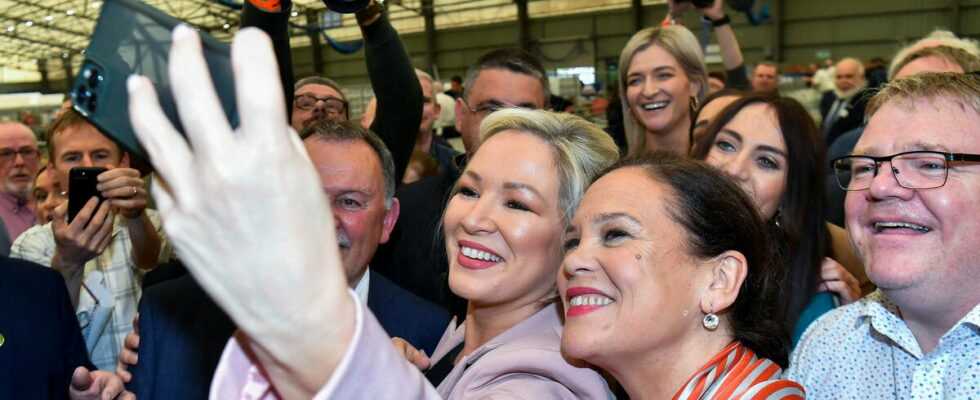A referendum in “a period of five years” ? The victory of Sinn Féin in the elections held Thursday in Northern Ireland gave hope to Mary Lou McDonald, the president of the party, historically in favor of a reunification of Ireland. “We believe unity is the greatest opportunity for all Irish people. […] But it has to be done in a planned, orderly, democratic and peaceful way. We must start now to prepare for the changes to come,” the leader enthused after the historic success of her political training: since its creation in 1921, Northern Ireland had never been dominated by nationalists.
But the leader will have to be patient, Sinn Féin not being authorized to organize such a consultation without the consent of London. Only the British Secretary of State for Northern Ireland, Brandon Lewis, can make this decision. But the latter, who met the main Northern Irish political leaders on Monday, is firmly opposed to the possibility of a referendum, as is Prime Minister Boris Johnson, embroiled in various political scandals and still weakened by the results of the Thursday’s elections in England.
“A referendum today would not be in the interest of the government at all, which has repeatedly said that Brexit will not lead to the dislocation of the United Kingdom”, explains Agnès Maillot, specialist in Northern Ireland at the University of Dublin. The United Kingdom’s exit from the European Union in 2016 provided an additional argument for nationalists, Sinn Féin vice-president Michelle O’Neill, who is expected to become Prime Minister of Northern Ireland, insisting that the reunification of the island was the “only solution to Brexit chaos”.
Concluded in 1998 after thirty years of a civil war which caused the death of approximately 3,500 people, the Good Friday agreements provide that the British government can call a referendum as soon as“it seems likely to him that a majority of voters would express the wish that Northern Ireland should cease to be part of the United Kingdom”. A vague formulation, which gives London a wide margin of maneuver. But such an approval rating still seems a long way off: Sinn Féin won less than 30% of the vote in Thursday’s election, and the number of seats it has in the Northern Ireland Assembly (27) remained unchanged. His victory owes a lot to the collapse of the DUP unionists, discredited by their unfailing support for Brexit.
“Brexit has reignited tensions and strengthened Sinn Féin, but parts of the population continue to fear reunification. She is not ready to budge on this issue,” summarizes Fabrice Mourlon, researcher at the Sorbonne-Nouvelle University. In recent years, polls have regularly shown that public opinion in Northern Ireland remains on the whole rather resistant to reunification, support for this project fluctuating between 30 and 40% according to the publications. It is higher in the Republic of Ireland, where Sinn Féin finished top in the 2020 elections, but failed to win power.
Faced with the hostility of the British government and the reluctance of her own population, Michelle O’Neill did not set a deadline for a hypothetical referendum during her campaign, structured around purchasing power and health rather than reunification. Anxious not to attack the Unionists and to “federate to create a dynamic around reunification”according to Agnès Maillot, the former Minister of Health said she was in favor of a transition “gentle”, who “belongs to everyone”. Sinn Féin hopes for the establishment of a “citizen assembly” throughout Ireland, on the model of the system that led to the approval by referendum of the legalization of abortion in Ireland in 2018.
Such a scenario is currently unthinkable in Belfast, where the nationalists will first have to work hard to form a government with the DUP, which has already expressed its reservations. Reunification is therefore not for tomorrow, to the great relief of London, which sees the hypothesis of a secession from Northern Ireland as an existential threat. “The United Kingdom is the union of Great Britain and Ireland. If there is no more Northern Ireland, it is the end of the United Kingdom as we know it, exhibits Agnès Maillot. And that would continue to fuel the independence aspirations of the other provinces of the country.” The First Minister of Scotland Nicola Sturgeon hastened to send her congratulations to Sinn Féin and Michelle O’Neill for their success “historical”.
